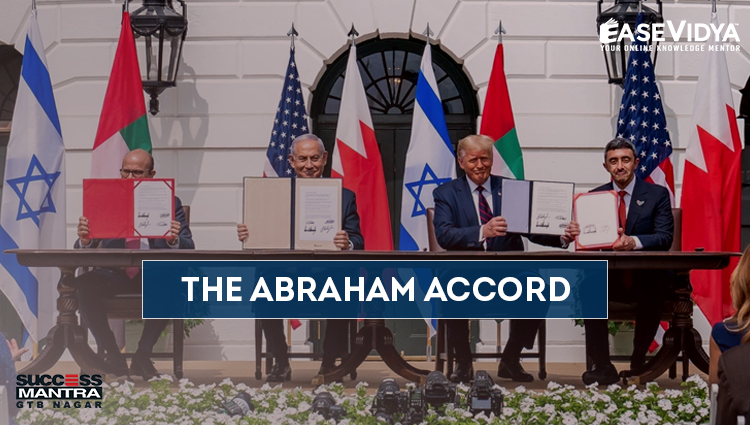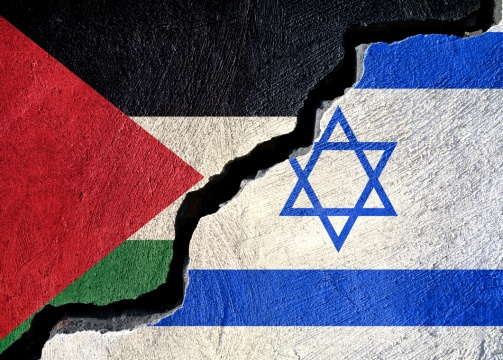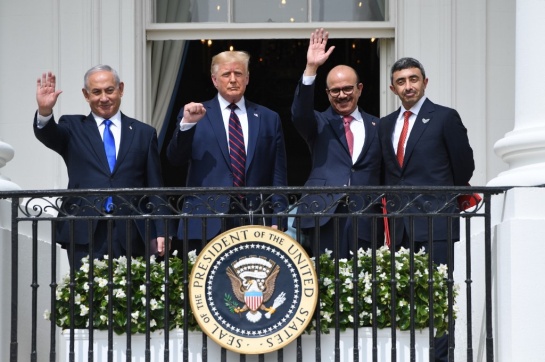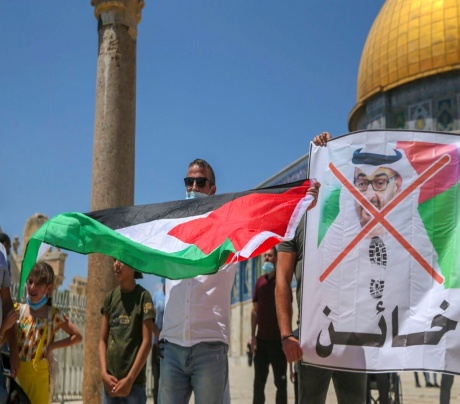
THE ABRAHAM ACCORD
ISRAEL & PALESTINE CONFLICT

The Israeli-Palestinian conflict dates back to the end of the nineteenth century, primarily as a conflict over territory. After the 1948 Arab-Israeli war, the Holy Land was divided into three parts: the State of Israel, the West Bank (of the Jordan River), and the Gaza Strip. Successive wars resulted in minor shifts of territory. In the Six-Day War in June 1967, Israel defeated Egypt, Jordan and Syria and occupied east Jerusalem, the West Bank, the Gaza Strip and the Golan Heights. The conflict was calmed by the Camp David Accords in 1979, which bound Egypt and Israel in a peace treaty. Yet once the wars over territory were over, a surge in violence and uprisings among the Palestinians began. The first intifada, in 1987, was an uprising comprising hundreds of thousands of Palestinians living in the West Bank and Gaza Strip. The 1993 Oslo Accords mediated the conflict. But in 2000, inspired by continuing Palestinian grievances, the second intifada began and was much bloodier than the first. After a wave of violence between Israelis and Palestinians in 2015, Palestinian President Mahmoud Abbas announced that Palestinians would no longer be bound by the Oslo Accords.
Since taking office, the Donald J. Trump administration has made achieving an Israeli-Palestinian deal a priority, but has yet to release its long-awaited proposal for a peace process. Trump’s decision to relocate the U.S. embassy to Jerusalem, reversing longstanding U.S. policy, was met with applause among the Israeli leadership but condemned by Palestinian leaders and others in the Middle East and Europe. Israel considers the “complete and united Jerusalem” its capital, but Palestinians claim East Jerusalem for the capital of their future state.
ABRAHAM ACCORD: ISRAEL, UAE & BAHRAIN

The Abraham Accord between Israel, the United Arab Emirates and Bahrain is mediated by the USA. It is the first Arab-Israeli peace deal in 26 years. There were the only two peace deals between Israel and the Arab States in more than a quarter of a century. Egypt was the first Arab State to sign a peace deal with Israel in 1979. Jordan had also signed a peace pact in 1994.
As per the Abraham Accord the UAE and Bahrain will establish embassies and exchange ambassadors. The Arab countries will be working together with Israel across a range of sectors, including tourism, trade, healthcare and security. The Abraham Accords also open the door for Muslims around the world to visit the historic sites in Israel and to peacefully pray at Al-Aqsa Mosque in Jerusalem, the third holiest site in Islam. In the Islamic tradition, the Kaaba in Mecca is considered the holiest site, followed by the Prophet's Mosque in Medina, and Al-Aqsa Mosque in Jerusalem. Bringing Israel, the UAE and Bahrain together reflects their shared concern about Iran’s rising influence in the region and development of ballistic missiles. Iran has been critical of both deals. Since Israeli independence in 1948, it has fought several wars with Arab neighbouring countries. The persecuted Jews saw Israel as their promised home while Arabs saw it as an occupation.
SIGNIFICANCE OF THE ACCORD
The agreement shows how the Arab countries are gradually decoupling themselves from the Palestine question. Palestine was among former Ottoman territories placed under UK administration by the League of Nations in 1922. All of these territories eventually became fully independent States, except Palestine. Full diplomatic ties will be established between Israel, the United Arab Emirates and Bahrain which will have a positive impact on the entire region. The deal buys UAE a lot of goodwill in the US, where its image has been tarnished by its involvement in the Yemen war. In South Asia, it will put Pakistan in a bind, whether to follow UAE’s steps (will be seen as giving up Islamic cause of Palestine) or not to follow the UAE (since it is already in feud with the Saudis over not taking up the Kashmir case, Pakistan cannot afford another hostile Islamic Country). In the upcoming presidential election in the USA, the accord could help shore up support among pro-Israel Christian evangelical voters, an important part of current President’s political base.
PALESTINIAN'S AND OTHERS CONCERN

Palestinians have condemned the Abraham Accords as a betrayal. The new agreement breaks a long-standing Arab consensus that the price of normal relations with Israel was independence for the Palestinians. 86% of Palestinians believe the normalization agreement with the UAE serves only Israel’s interests and not their own. There is a possibility that the Palestine quest is further ignored. Shia-Sunni rifts in the region may get wide and violent. Saudi Arabia (Sunni) and Iran (representing Shia) have a long history of enmity. The deal works on a number of levels for the US president. It is a big boost for his strategy of "maximum pressure" on Iran. It is also useful ammunition, especially in an election year, to back his boast that he is the world's best dealmaker. For decades, one of the main sources of instability in West Asia has been the cold war between Saudi Arabia and Iran. The Sunni-Shiite schism may also provoke violence between Muslims in such places as Pakistan, Nigeria and Indonesia.
INDIA'S INTEREST IN WEST ASIA
West Asia occupies an important position in international relations due to its geographical location and proximity to continents and countries South Asia, China, Central Asia, Europe, and Africa. It is the world's largest oil-producing region accounting for 34% of world production, 45% of crude oil exports and 48% of oil proven reserves. India should use this unexpected opportunity to give itself a bigger role in a region which is its strategic backyard. The first step should be to ramp up defence and security relations with UAE. Israel is already a very close defence partner. While some work has already happened, India should leverage its economy for a bigger opening in this region. Importantly, India can use its good offices to ensure that any future deal on a regional security framework gives adequate space to Iran, which may be weak but not so weak that it cannot be a hugely disruptive power if it so chooses.
POSSIBLE CONSEQUENCES
A balance between Shia and Sunni, between Persian and Arab, is key to any sustainable peace. The US may be a pre-eminent power in the Middle East, but Russia has made a space for itself, spending a lot less money. In recent years, China has indicated its willingness to play a larger role in this region, and is close to both UAE and Israel and, increasingly, Saudi Arabia.
India should make its moves before this market and this extended neighbourhood comes under the Chinese sphere of influence. A deal that could, if played right; open the doors for a changed geopolitical arrangement in the Middle East should have a stronger Indian footprint.
QUESTIONS (1-10)
Q.1 The Israeli-Palestinian conflict dates back to the end of the nineteenth century, primarily as a conflict over which of the following Territory?
A. Gaza City
B. Jerusalem: ANSWER
C. Tel- Aviv Yafo
D. Nazareth
Q.2 In which of the following wars in june 1967, Israel defeated Egypt, Jordan and Syria and occupied east Jerusalem and other territories?
A. Six Days War: ANSWER
B. Fifteen Days War
C. Hundred Days War
D. None of the above
Q.3 Currently, what are the internationally recognized capitals of Israel and Palestine respectively?
A. Jerusalem, East Jerusalem: ANSWER
B. Tel Aviv, Jerusalem
C. East Jerusalem, Jerusalem
D. Gaza City, Tel Aviv
Q.4 Recently three countries have signed a Peace Deal named as "Abraham Accord". Which of the following are the three countries?
A. Israel, UAE & USA
B. Israel, UAE & India
C. UAE, Palestine & Bahrain
D. Israel, Bahrain & UAE: ANSWER
Q.5 Recently signed Abraham Accord is Peace Deal that is signed between Israel and Arab countries after ________?
A. 20 Years
B. 22 Years
C. 25 Years
D. 26 Years: ANSWER
Q.6 Earlier to the Abraham Accord which of the two Arab countries have signed a Peace Deal with Israel?
A. Saudi Arabia and Egypt
B. Egypt and Jordan: ANSWER
C. Oman and Iran
D. Egypt and Oman
Q.7 The Abraham Accords will open the door for Muslims around the world to visit the historic sites in Israel and to peacefully pray at _________ in Jerusalem?
A. Al Aqsa mosque: ANSWER
B. Prophet Muhammad' mosque
C. Masjid Al Haram
D. Masjed Quba
Q.8 Which of the following statements is correct, over the stand of USA in Israel & Palestine conflict?
A. USA is supporting Palestinians against Israel.
B. USA is supporting Israel and has its embassy in Jerusalem: ANSWER
C. USA does not have a clear stand over the issue
D. None of the above
Q.9 Which of the following countries have condemned the Abraham Accord as it is breaking it's consensus with Arab Countries?
A. Palestine: ANSWER
B. Iran
C. Iraq
D. Saudi Arabia
Q.10 Consider the following statements and answer that which of the following statements are the possible advantages to India due to Abraham Accord?
A. India can ramp up defence and security relations with UAE.
B. India will further strengthen its diplomatic ties with Israel.
C. These Gulf countries are largest oil producing countries which will benefit India.
D. All of the above: ANSWER












0 Comment